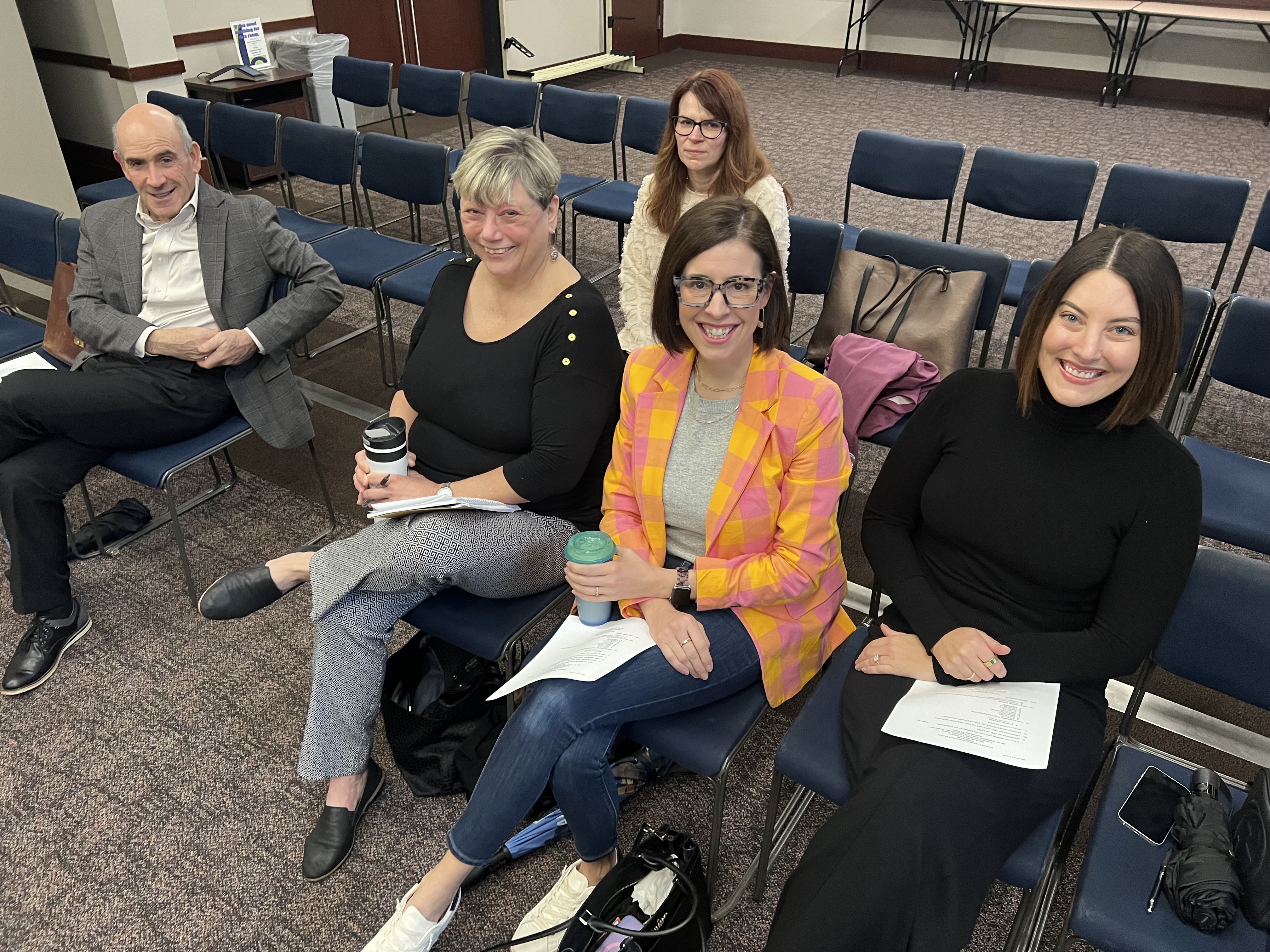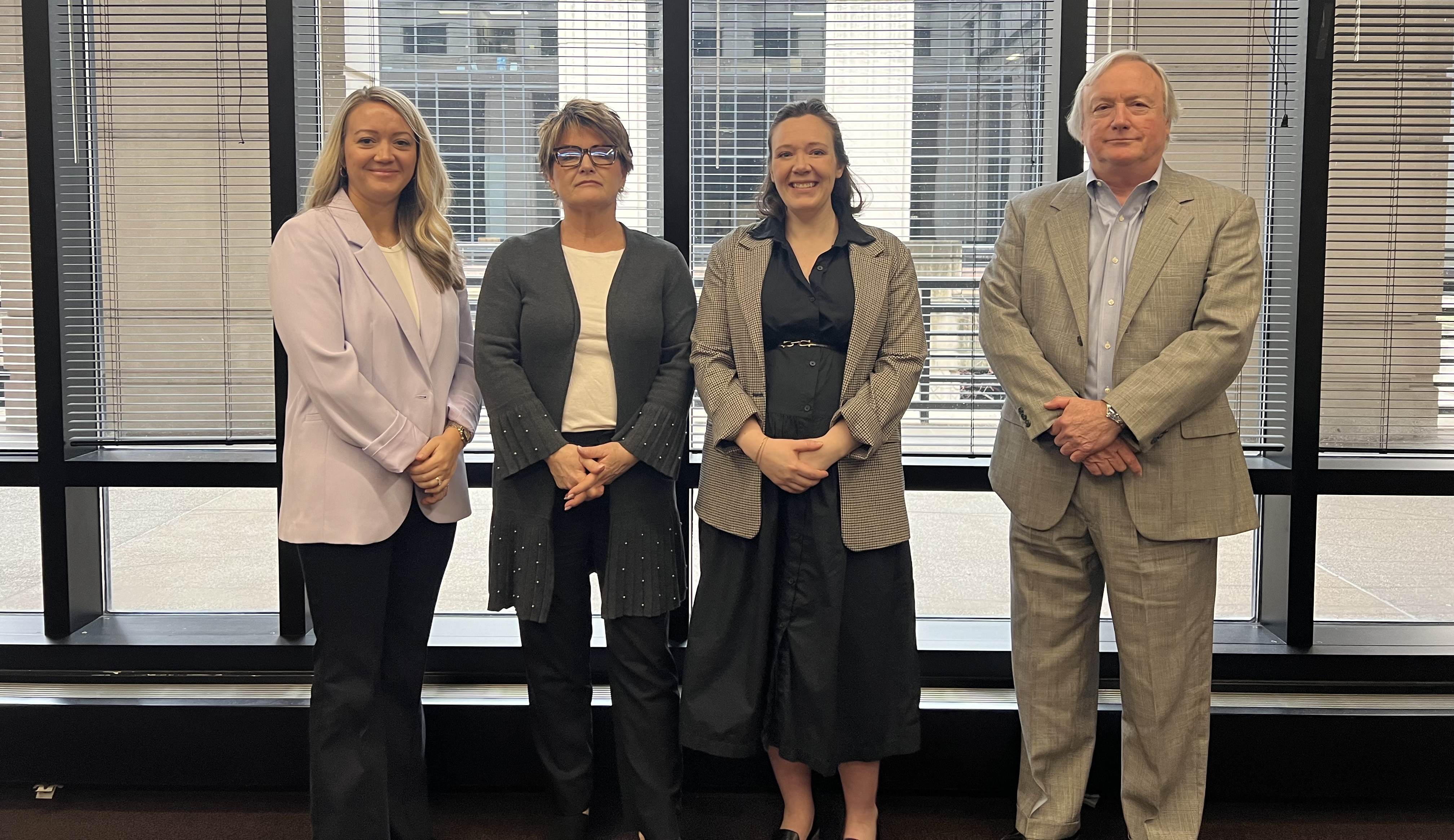
L-to-R: Meeting attendees Bob Lazard, CPA-retired, Sherrill Rude, CAE, Amanda Horvath, CPA, Courtney Kincaid, CAE, Ali Tonini, CAE
You may have only thought about the Board of Accountancy when you were getting your license or at renewal, or if one of your colleagues didn’t pass their CPE audit. However, their role reaches far beyond disciplinary action.
The Board provides input and decisions on two key levels: 1) for individual CPAs in Indiana; and 2) for state and national CPA profession regulation.
How do they do this? By administering and enforcing the Uniform Accountancy Act; setting rules for CPAs and CPA Exam candidates in Indiana, while the Indiana Professional Licensing Agency manages the application and renewal system on their behalf.
As one of 55 jurisdictions with Boards of Accountancy, they also serve as our megaphone to their national organization: the National State Boards of Accountancy (NASBA). And right now, Indiana needs that megaphone to share our voice on the issue of CPA licensure models and barriers to the profession.
This small-but-mighty leadership group clearly has significant influence on the profession yet remains mostly under the radar for CPAs. So, we are highlighting who they are, what they do, what they discuss in their meetings, and why it matters to you and the profession.
Meet Your Board
There are currently four members, each of them appointed for service by Gov. Holcomb, with one vacant seat left to be filled by an actively licensed CPA in Indiana.
- Michelle Skeen, CPA, a senior manager at OnTarget CPA, has served for eight years and began her term as chair this year.
- Sarah Schenkel, CPA, a director at Katz, Sapper & Miller, is new to the board and serving as vice chair.
- Colleen Scheele, JD, public policy counsel and director of tax and fiscal policy at NAMIC, is new to the board and a consumer member. In this role, she lends input, questions and expertise based on her experiences as a licensee in her own profession as well as her knowledge of accounting and financial statements. She also serves as the board’s ALJ (liaison to Attorney General’s office in overseeing disciplinary cases and negotiating settlements.)
- John Wright, CPA, MST, an ambassador at Forvis Mazars, is new to the board.
The INCPAS advocacy team met with each new appointee one-on-one before they started their term, offering a “Board of Accountancy Bootcamp” of sorts to help them understand their role and get up-to-speed on any current or ongoing issues.
This year’s elected chair, Michelle Skeen, is now serving her eighth year on the Board.
“Obtaining my CPA license was the highest achievement in my educational career — I couldn’t think of a better way to honor that achievement than by serving on the Accountancy Board,” Skeen said. “In my new role, I would like to bring more awareness to the talent shortages in the pipeline and to educating current and future CPAs on the importance of licensure — not only to the CPA profession but to the public at large.”
What the Meeting Is Like
Similar to most regulatory meetings one would attend, it’s in a nondescript conference room within the Indiana Government Center.
The meeting is run professionally, but not impersonally. The Board members are conversational, respectful, thoughtful and efficient with their review of each agenda item, even though their audience is minimal — two members of the INCPAS Government Relations Advisory Council (GRAC) team and four members of the INCPAS staff.
Robert “Bob” Lazard, CPA-retired, a member of GRAC, is present. Although he’s retired, he finds value in serving in this advisory role and attending the Board of Accountancy meetings.
“I gained a lot of knowledge over my 43-year business career,” Lazard said. “Volunteering by serving on non-profit and government boards and committees is a good way to give back to the community and the profession.”

L-to-R: Board of Accountancy members Sarah Schenkel, CPA, Michelle Skeen, CPA, Colleen Scheele, JD, John Wright, CPA, MST
What They Discuss
The meeting begins with the usual board formalities, including reviewing meeting minutes and a quick update from the Attorney General’s Office representative with open case updates.
-
Application Review
There are no CPA license reinstatement requests this time, but there is a Transfer of Grades request. This requires reviewing the candidate’s documentation, which includes submitted grades, test scores and work experience. After agreeing everything checks out, the group advises the IPLA director to send the candidate a notice of approval.
- This discussion is important because it determines how many aspiring CPAs can enter the pipeline in Indiana and how many lapsed or non-compliant CPAs can re-enter.
- CPE Hardship Waiver Request Review
CPAs unable to meet their reporting requirements due to extenuating circumstances within a certain year or reporting cycle can submit a hardship waiver, with proper documentation. This can be due to medical or personal issues. Approval for a waiver of hours due to hardship is at the board’s discretion.
Generally, confusion about hours required in a set time frame, variation in state requirements, missing Ethics or A&A hours, and more do not qualify for a hardship waiver and are considered issues of noncompliance.
The group discusses each case and the supporting documents, factoring in historical data such as previous track record of meeting requirements and future-oriented data such as the individual having a plan in place to make up the hours and not be out of compliance in the future.
They aren’t making assumptions about licensees. Where applicable, the group asks for IPLA to request additional information from some of the individuals such as: “What are you asking us to approve?” “What’s your plan?” “What CPE have you completed?”
- This discussion is important because it allows for issues beyond a licensee’s control, while still providing enforcement parameters to uphold the integrity of the CPA license.
- IPLA Board Director’s Report
Toby Snell from the Indiana Professional Licensing Agency (IPLA) serves as board director and is responsible for keeping minutes and accurate records and to answer Board member’s questions as needed. (Fun fact: the Board of Accountancy is only one of eight profession boards she represents for the State of Indiana).
In the 2023 legislative session, the INCPAS advocacy team helped advocate for additional funding for the IPLA Modernization Project. As an outcome of the modernization initiative, Toby shares the 2024 license renewal will be entirely online through the license portal vs. a combination of paper and electronic records as it has been in the past.
- This report is important because it ensures the Board of Accountancy knows what IPLA is working on that will affect licensees, and INCPAS can communicate need-to-know updates back to CPA members and/or organizations that will be impacted.
- Discussion Item: NASBA Professional Licensure Task Force Model
Donald “Ned” Hannah, the board’s counsel from the Attorney General’s Office, is at the meeting to lend legal counsel to the board as needed. He gives the thumbs-up to weigh in on NASBA’s national survey of Boards of Accountancy on if they should pursue equivalent licensure models.
Bringing her unique perspective to the table, consumer member Scheele says that, as a licensed attorney, her colleagues were able to pursue their degrees in ways that fit their needs best and — if getting more CPAs into the pipeline was an issue — why wouldn’t Indiana want to consider it?
“I was asked to become the consumer member by the Governor’s Office due to my background in law and tax,” Scheele says. “So while I am not a CPA, I do have experience with the accounting profession. Also, I am licensed under a different board here in the state, which is a helpful lens to view board decisions.”
The group agrees to submit its support for NASBA’s substantial equivalency model research, allowing pipeline and issues related to barriers to licensure to be examined and solutions discussed. This sets the precedent for future discussions and decisions on this issue.
Accountancy compliance officer Rachelle Cannon-Mason will submit Indiana’s response to the survey. (Fun fact: Accountancy is one of three professions to have a full-time compliance officer — INCPAS successfully advocated for this role to help ensure the Accountancy Act was enforced and there would be a dedicated point-person for current and aspiring CPAs. This position is supported by an investigative fund which receives $30/licensee at renewal and civil penalties and fines.)
“As long as the State Boards of Accountancy tell us to continue, our goal is to bring the development of the Concept to the June Regional Conferences where board members from the 55 U.S. accounting jurisdictions will receive more information and have additional opportunities to provide comment,” says Stephanie Saunders, CPA, 2023–24 NASBA Chair. “Who is going to be the conductor here? I want it to be the State Boards of Accountancy because, at the end of the day, it is their legislatures that are going to adopt the rules.”
- This survey feedback from Indiana is important because it directly impacts NASBA’s Professional Licensure Task Force work with examining how licensure models may need to change in order to attract (and retain) more CPAs in into the accounting pipeline. The Board’s approval of their research also opens the door for discussing related issues in the future.
- Notes from Audience
INCPAS VP – Advocacy Sherrill Rude, CAE, suggests the board discuss members attending NASBA meetings and submitting an annual budget to the state to use the Investigative Fund for NASBA meetings and travel. As this year’s chair, Skeen will be attending regional conferences to listen, learn and speak on behalf of Indiana’s Board of Accountancy.
- Meeting Adjourns
Since it was a light agenda and the Board members were all prepared, efficiency ruled the day and the agenda was covered in less than an hour. Wright headed back to Evansville, Schenkel to Fort Wayne, while Skeen and Scheele made the quick drive back to their Indianapolis offices.
They will reconvene three more times in 2024, and any INCPAS member or CPA is welcome to attend in person or virtually (a new option that is part of the PLA Modernization Task Force initiatives).
“INCPAS feels it is important to have CPA member participation at the State Board of Accountancy meetings in addition to having INCPAS staff there,” Lazard said. “It shows the Board that the membership is paying attention to what they do and that they’re available to provide input before or after their discussions.”
Next Steps for INCPAS Members
Interested in learning more and getting involved?
- See for Yourself. The next 2024 Board of Accountancy meetings are September 20 and November 8 at 9 a.m. ET at the Indiana Government Center in room W064, if you’d like to attend.
- Test the Waters. Volunteer to serve on the Government Relations Advisory Council or become a CPA Advocate to help set the future direction of the profession.
- Take a Seat. There is still one vacant seat left on the Board of Accountancy. This is a phenomenal leadership opportunity for a licensed CPA who would like to be part of a thoughtful group helping the profession on both a micro and macro level.
- Invest in Relationships. A contribution to the Indiana CPA-Political Action Committee helps INCPAS invest in legislative efforts that build and sustain collaborative working relationships with Indiana agencies such as the Board of Accountancy, Professional Licensing Agency, Department of Revenue, IRS and more.
Contact Sherrill Rude if you are interested in attending a Board of Accountancy meeting or volunteering.